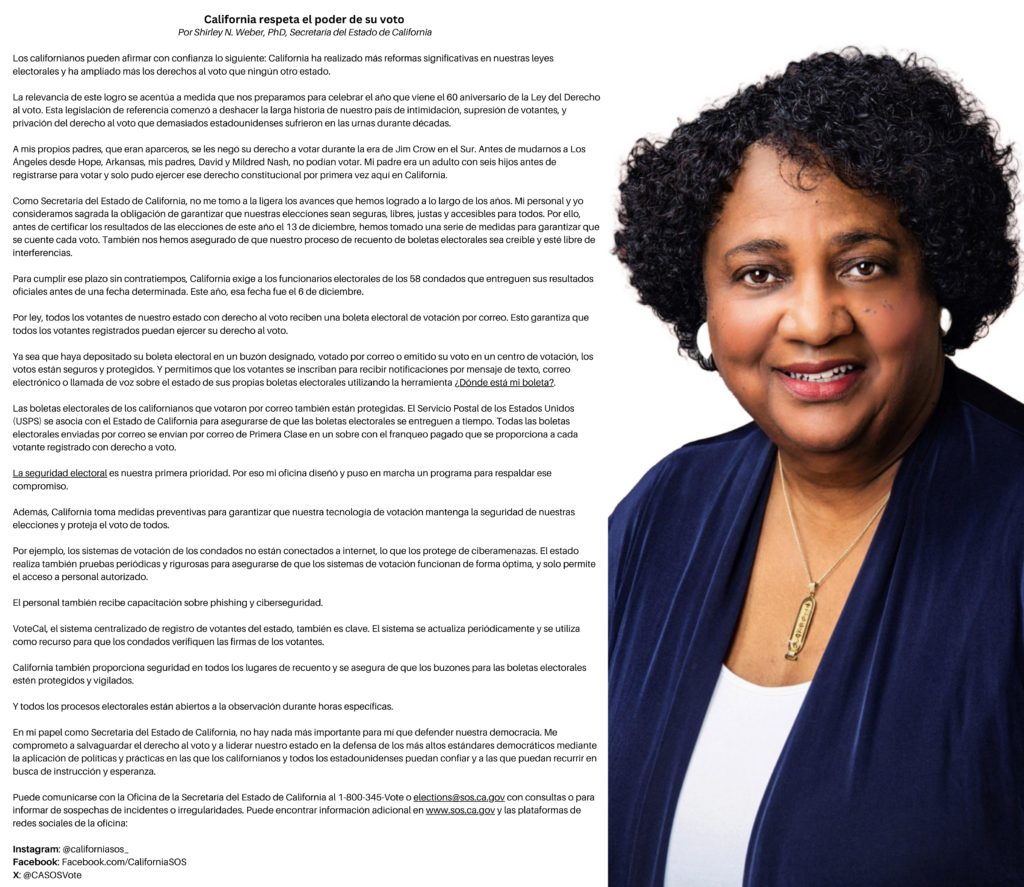Latina math educator Aileen Rizo: ‘We can stand up to injustice’
4 min read
Photo CSUSB: Aileen Rizo, an equal-pay advocate, STEM and mathematics educator, and former California State Assembly candidate, discussed her experiences filing a wage-discrimination lawsuit, raising awareness about the gender pay gap, and spearheading a call for more diversity in education, the workplace, and political representation.
Latina math educator Aileen Rizo: ‘We can stand up to injustice’
Aileen Rizo was the only Latina in her high school’s calculus class. She was she only member of her family to go to college. As an educator, she was the only woman employed full-time in her mathematics department.
But when she earned less than her male counterparts for the same work, she decided to take a stand — even if she was the only one.
“Whatever a woman decides in the workplace, she decides not only for herself, but for those who come after,” said Rizo, who visited Cal State San Bernardino on Sept. 30 to present “Equal Pay for Equal Work: A Conversation with Aileen Rizo,” part of the College of Natural Sciences Gerald M. Scherba Lecture Series.
Rizo’s talk was part of the college’s and university’s commitment to promote diversity, especially in the sciences, said Sastry Pantula, dean of the College of Natural Sciences.
“It is important for our students, faculty, staff, advisers and community to hear her story, and hear her commitment to enhancing diversity and the importance of having great role models from P-12 to higher education,” said Pantula. “To this end, we are investing in training future STEM teachers and getting ready to recruit 20 excellent faculty this year from diverse backgrounds who are outstanding citizens in our community.”
Rizo, an equal-pay advocate, STEM and mathematics educator, and former California State Assembly candidate, discussed her experiences filing a wage-discrimination lawsuit, raising awareness about the gender pay gap, and spearheading a call for more diversity in education, the workplace, and political representation.
“We need mathematicians in office,” she said. “We need scientists in office. We need engineers in office.”
A longtime math teacher, Rizo previously worked at the Fresno County Office of Education training math instructors for multiple school districts. She explained how she trained teachers in using origami to engage with students and help them learn mathematics. Rizo also organized a Lego engineering competition to reinforce learning.
But she eventually discovered that some of her male co-workers with less experience and less education earned more than she did based on a human-resources practice that considered prior salaries.
She confronted her employer’s human-resources department and eventually filed a wage-discrimination lawsuit in 2014 under the Equal Pay Act and California’s sex-discrimination statutes. The U.S. Court of Appeals for the Ninth Circuit later ruled in favor of Rizo, determining that using prior salary alone cannot justify a wage differential between men and women under the Equal Pay Act. Fresno County later appealed the decision. This past February the U.S. Supreme Court — on a technical issue and not on the merits of an equal-pay case — vacated and remanded the Ninth Circuit’s decision and sent it back to the appellate court for additional review.
The Latina mother of three described how her young daughters were a key motivation in pursuing the lawsuit. Rizo also cited her grandmother’s passion for education as another source of strength.
During her presentation, she referenced Aline Black, an African American chemistry teacher who was the first educator to file a suit against salary discrimination in Virginia and helped pave the way toward equal pay for black educators.
“Injustice not stood against, keeps going,” Rizo said. “It gets perpetuated.”
Through her efforts, Rizo successfully helped push a 2017 bill signed by then-Gov. Jerry Brown that prohibits public and private employers from seeking or relying upon the salary history of applicants for employment.
“We can make those changes,” she said. “We can stand up to injustice. And when we do it, we change the world for the better, and it’s so important.”
Last year, Rizo launched her campaign to represent California’s 23rd State Assembly District, which includes portions of the city and county of Fresno. While she was not successful in the election, she continues to advocate for pay equity and diversity.
“Every time we stand up for ourselves, we stand up for someone else,” she said.
Rizo’s talk was partially supported by the Intellectual Life Fund and Clare Weber, CSUSB’s deputy provost for academic affairs.
In addition to her talk, Rizo met with Kim Cousins, the chair of the Department of Chemistry and Biochemistry; and Donna Garcia, a professor in the College of Social and Behavioral Sciences’ Department of Psychology. She was also interviewed by the Coyote Radio team for a later broadcast and met with students for lunch in the Coyote Commons.
The Gerald M. Scherba Endowed Program Lecture Series at CSUSB offers the public a clear understanding of the natural sciences and what they contribute to the world.
The science speaker series is named after Cal State San Bernardino founding faculty member Gerald Scherba, the first science professor hired in 1962 by then-San Bernardino-Riverside State College founding president John M. Pfau. The college opened in 1965. Scherba first served as chair for the Natural Sciences Division. In 1968, he became the first dean of academic affairs at Cal State San Bernardino. In 1984, he was named director for the California State University Field Station for Research and Education in the Mojave Desert town of Zyzzx, Calif. He retired in 1994 and passed away in 2001.






Subscribe
To Our Newsletter
Join our mailing list to receive our Weekly Wrap of top stories, each week.
Thank you for the support!
You have Successfully Subscribed!
Colton Courier - El Chicano - Rialto Record